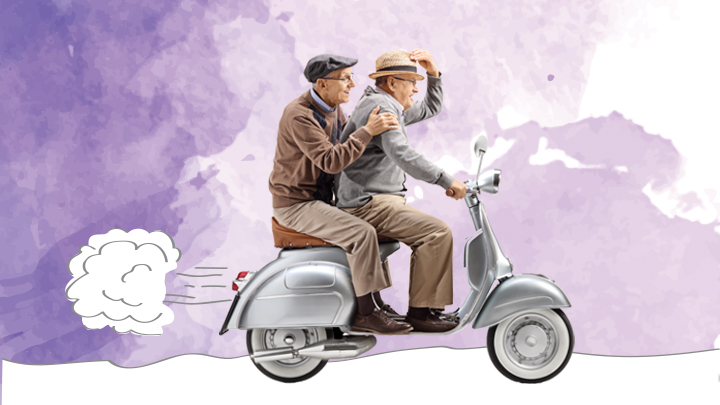We’ve all heard the negative stereotypes about older drivers – but psychology professor Nancy Pachana says it’s time for people to start treating senior motorists with respect.
Pachana, the co-director of the University of Queensland’s Ageing Mind Initiative, says that older drivers have been saddled with a reputation they don’t deserve.
“The research says that driving is a skill that benefits from experience,” she says. “The more experience you have as a driver, the safer you are on the road. For example, people with more experience behind the wheel can look ahead and scan the environment more efficiently than less experienced drivers.
“Of course, if you have physical or cognitive impairments, that will affect your ability to drive. But people of any age can have those impairments – age itself isn’t any sort of liability. The group of drivers with the highest accident rate is actually young males, not older people.”
“The group of drivers with the highest accident rate is actually young males, not older people.”
Pachana believes that ageism, not data, is responsible for the negative perception of older drivers in the community.
“I think society makes a lot of assumptions about older people and their ability to do things – not just when it comes to driving, but across the board.
“It’s the same as people who think women can’t drive as well as men. If someone cuts them off in traffic, but they’re a man, that won’t factor into their thinking. But if it’s a woman, they’ll think, ‘Oh, see, that proves I was right’. It’s the same thing with any of the ‘-isms’ – ageism, sexism, racism, all of it. There’s a large confirmation bias at play, in that people look for the information that confirms their bias.”
Should restrictions be placed on older drivers?
Pachana warns that unnecessary restrictions on older drivers on the basis of age alone can actually have a significant impact on their mental health.
“When people have to give up driving, for any number of reasons, it has an effect on how well they’re able to maintain social connections in the community, and just do the things they want to do,” she says.
“In my own research, I’ve found that losing your licence has a real effect on your sense of identity. Your licence gives you a great sense of freedom, because it means you’re in charge of your mobility. If that gets taken away, it can change your conception of yourself.”
“Losing your licence has a real effect on your sense of identity.”
In the absence of proof that older drivers pose a greater risk on the road, Pachana is skeptical of any law that discriminates against drivers purely on the basis of their age.
“There’s simply no data that says you should base a person’s ability to hold a licence on their age,” Pachana says.
“You can be unfit to drive at 35, and you can be perfectly competent at 90. There are some older drivers who have problems, of course, but there has to be some kind of a trigger for the test.
“If you’re testing people based on their age, when there’s no proven link between age and the skill you’re testing – well, that doesn’t seem like a very fair test to me.”
What do older drivers need to do to keep their licence in Australia?
Tasmania, South Australia and Western Australia have all scrapped or reduced testing requirements for older drivers in recent years, citing a lack of evidence that these requirements help to prevent fatal crashes.
But most states and territories still require senior motorists to meet certain conditions.
Queensland
From the age of 75, drivers must carry a valid medical certificate with them when they drive. The certificate is valid for a maximum of 13 months. The doctor who issues the certificate can impose certain restrictions on the driver, and can issue the certificate for a shorter period if they feel more regular checks are required.
New South Wales
From the age of 75, drivers need to complete a medical review every year. From the age of 85, drivers need to pass a practical driving assessment every second year to keep their unrestricted licence.
Modified licences – which restrict older drivers to certain areas and conditions – are available for older drivers who choose not to take the practical test.
Victoria
Drivers are not required to pass a test or carry a certificate when they reach a certain age. However, if an older person develops a medical condition that might affect their ability to drive, they can be required to pass a medical review in order to keep their licence.
South Australia
From the age of 75, drivers are sent an annual self-assessment form. The onus is on the driver to fill out the form truthfully, and they can also ask for help from a doctor.
If a doctor is unsure of an older person’s fitness to drive, the driver will be required to pass a practical driving assessment.
Western Australia
From the age of 80, drivers need to complete an annual medical review to renew their licence. From the age of 85, drivers can be required to pass a practical test, but only if their doctor recommends it.
Tasmania
From the age of 65, drivers can only renew their licence for five-year periods. All drivers are legally required to report any medical condition they have that might affect their driving, but there are no compulsory tests.
Australian Capital Territory
From the age of 75, drivers must be annually examined by their own doctor to confirm they are safe to drive.
Northern Territory
At any age, drivers can be required by the Registrar of Motor Vehicles to prove they have the requisite skills and are medically fit to hold their licence.



